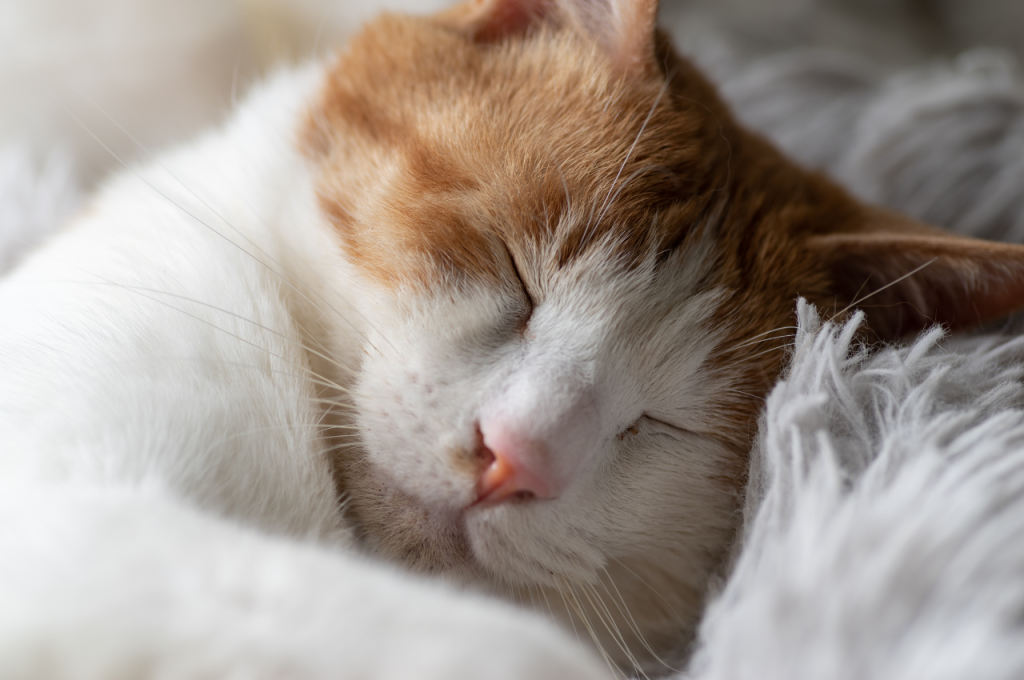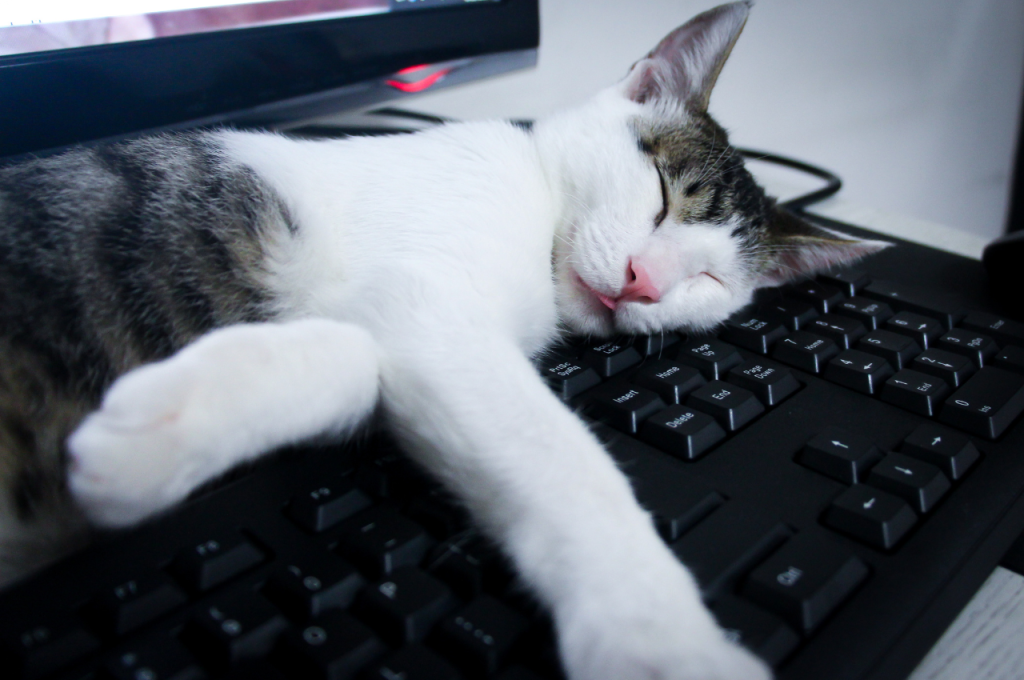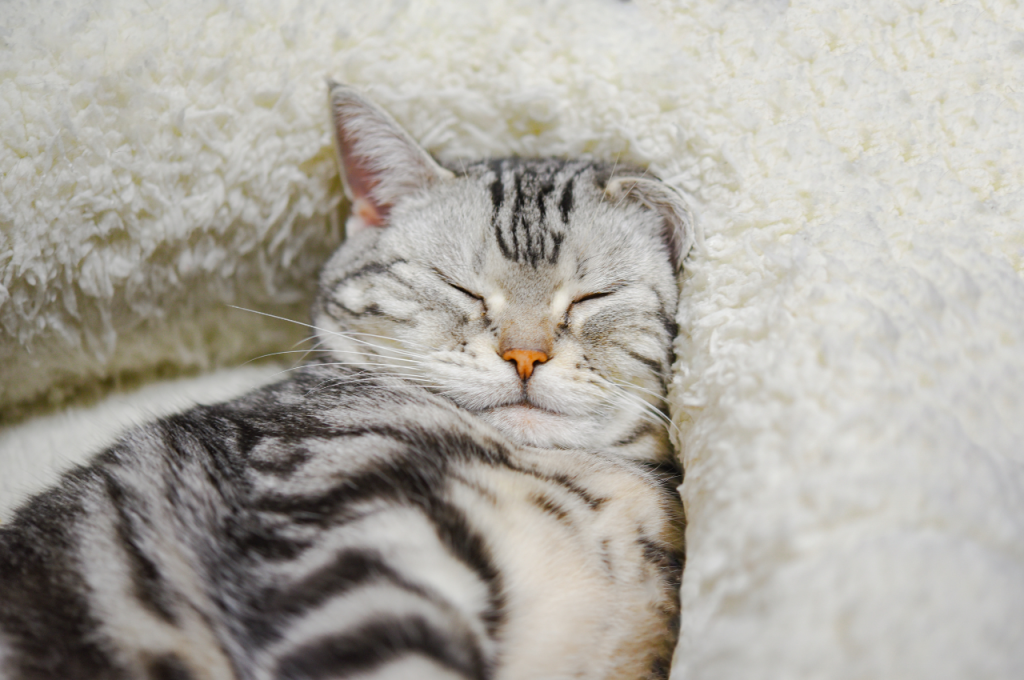To help your cat sleep at night, you can give them a warm and comfortable sleeping environment.
You can create a calming bedtime routine by using soothing aids such as calming treats, natural supplements like melatonin, or pheromone diffusers to relax your cat. Ensuring they have plenty of exercise during the day, a comfortable sleeping area, and reducing nighttime distractions can also improve their sleep. However, before giving your cat any sleep aid, it’s essential to consult with your vet to ensure it’s safe and appropriate. Learn more about how to help your cat sleep peacefully at night and create a more restful environment for both you and your pet.
Cats and Their Sleep Patterns
Cats are fascinating creatures with unique sleep patterns that differ from those of humans. Understanding their nocturnal nature and the amount of sleep they need can help you provide the best environment for your feline friend. Let’s explore the intriguing world of cats and their sleep patterns.

The Nocturnal Nature of Cats
Cats are crepuscular animals, meaning they are most active during dawn and dusk. This natural behavior can lead to nighttime restlessness, especially if your cat’s sleep routine is disrupted. Providing a comfortable sleeping space and engaging your cat in play during the day can help promote a more restful night’s sleep.
How Much Sleep Do Cats Need
Cats typically sleep for 12 to 16 hours a day, which may vary based on their age and individual preferences. Kittens and senior cats may require more sleep, while adult cats often have shorter, more frequent naps throughout the day and night. Creating a cozy, quiet sleeping area and establishing a regular bedtime routine can encourage healthy sleep habits for your cat.
Challenges with Cats Sleeping at Night
Cats are naturally nocturnal creatures, which can pose challenges when they’re awake and active at night while you’re trying to sleep. Many cats experience bursts of energy in the late evening or early morning, leading to disruptive behaviors like scratching, meowing, or running around the house. Changes in routine, stress, or an under-stimulated day can also lead to restless nights. Additionally, if a cat’s feeding schedule doesn’t align with their owner’s sleep, hunger might wake them up. Addressing these challenges involves creating a stimulating environment during the day, providing a structured routine, and offering calming spaces or natural sleep aids to encourage a more restful night for both you and your cat.
Disrupted Human Sleep
Cats can be notorious for disrupting their owners’ sleep at night. Their nocturnal nature and tendency to be most active during the late hours can lead to disturbed sleep patterns for their human companions. This can cause frustration and fatigue for cat owners, impacting their overall well-being.
Common Reasons Cats Stay Awake
- Lack of physical activity during the day
- Stress or anxiety
- Hunger or thirst
- Health issues
- Desire for attention or play
Safe Solutions for a Restful Night
Cats are known for their independent nature, but they can sometimes struggle to settle down for the night. If you’re wondering what you can give your cat to help them sleep at night, there are safe and effective solutions that can promote a restful night’s sleep. From creating a comfortable sleep environment to establishing a soothing routine, there are several strategies you can use to encourage your feline friend to sleep peacefully through the night.
Creating a Comfortable Sleep Environment
- Choosing the right bed: Cats are selective about their sleeping spots, so providing a comfortable and cozy bed is essential. Look for a soft, padded bed that offers a sense of security, and place it in a quiet, dimly lit area of your home.
- Temperature control: Ensure the sleeping area is kept at a comfortable temperature, typically between 65-75°F. Use insulating curtains to regulate the room temperature and block out any excess light that might disturb your cat’s sleep.
Establishing a Routine
- Regular playtime: Engage your cat in interactive play sessions during the day to help them expend energy. This can encourage them to rest more soundly at night.
- Consistent feeding times: Establish a regular feeding schedule to help regulate your cat’s natural sleep-wake cycle. Avoid feeding them right before bedtime to prevent restlessness.
Dietary Considerations for Better Sleep
When it comes to helping your cat sleep better at night, dietary considerations play a crucial role. By focusing on the right food and timing, you can promote a restful night’s sleep for your feline friend.
Food Timing and Its Impact
Feeding your cat at consistent times can help regulate their sleep-wake cycle. Avoid feeding late at night to prevent disruptions in their sleep.
Sleep-inducing Foods for Cats
- Turkey: Contains tryptophan, a precursor to serotonin and melatonin.
- Pumpkin: Rich in fiber and can aid digestion for better sleep.
- Chicken: High in protein, which promotes muscle repair during sleep.
Calming Supplements and Their Efficacy
Calming supplements for cats can aid in reducing anxiety and promoting sleep. Natural options like chamomile and valerian root can be effective, but it’s important to consult with a veterinarian to ensure safety and proper dosage.

Natural Supplements
When it comes to helping your cat sleep at night, natural supplements are a great option. These supplements are made with natural ingredients that have calming properties and can help soothe your cat’s anxiety. Some of the most popular natural supplements for cats include:
- Valerian root
- Chamomile
- L-theanine
- Ashwagandha
These supplements can be given to your cat in various forms, such as capsules, chews, or drops. They are easy to administer and have little to no side effects. However, it is important to note that not all cats may respond to natural supplements in the same way. It is best to consult with your veterinarian before giving your cat any new supplements.
When to Consider Vet-approved Medication
In some cases, natural supplements may not be enough to help your cat sleep at night. If your cat is experiencing severe anxiety or stress, your veterinarian may recommend prescription medication. These medications are designed to help calm your cat’s nerves and help them sleep through the night. Some of the most common medications prescribed for cats include:
| Medication | Usage |
| Benzodiazepines | Used to treat anxiety and insomnia |
| Amitriptyline | Used to treat anxiety and depression |
| Trazodone | Used to treat anxiety and sleep disorders |
It is important to note that these medications should only be given under the guidance of your veterinarian. They may have potential side effects and can interact with other medications your cat may be taking. Your veterinarian will be able to determine the best course of treatment for your cat based on their individual needs.
In conclusion, there are several options available when it comes to helping your cat sleep at night. Natural supplements and vet-approved medication can both be effective in calming your cat’s nerves and promoting restful sleep. Consult with your veterinarian to determine the best course of action for your feline friend.
The Role of Play and Exercise
Play and exercise are crucial for a cat’s physical and mental well-being. Providing toys and playtime can help them expend energy and tire them out for a better night’s sleep. Additionally, making sure they have a comfortable and cozy sleeping space can also encourage restful sleep.
Cats are naturally active creatures, and they require play and exercise to keep them healthy and happy. In fact, play and exercise can also help your cat sleep better at night. When your cat is active during the day, they are more likely to sleep soundly at night. In this article, we will explore the importance of play and exercise, and provide tips on how to engage your cat in interactive play sessions and the right timing for play.
Interactive Play Sessions
Interactive play sessions are a great way to keep your cat engaged and active during the day. These sessions involve using toys that your cat can chase, pounce on, and bat around. Some popular cat toys include feather wands, laser pointers, and catnip-filled mice. When engaging in interactive play sessions, it is important to ensure that the toys are safe for your cat to play with and that you supervise the playtime to prevent any accidents.
The Right Timing for Play
The timing of play is also important when it comes to helping your cat sleep at night. It is best to schedule playtime during the day when your cat is naturally more active. This will help your cat burn off excess energy and tire them out, making it easier for them to sleep at night. Avoid playing with your cat right before bedtime, as this may stimulate them and make it harder for them to fall asleep.
In conclusion, play and exercise are crucial for your cat’s overall health and well-being. Engaging your cat in interactive play sessions and scheduling playtime during the day can help them sleep better at night. Remember to always supervise your cat during playtime and choose safe toys that they can enjoy.
Soothing Music and Sounds
Soothing music and calming sounds can be an effective way to help your cat sleep at night. Cats respond well to soft, gentle tunes, especially those with slow rhythms and calming frequencies. Music specifically designed for pets, like classical or ambient music, can create a peaceful environment that encourages relaxation. White noise or natural sounds, such as rainfall or ocean waves, can also help block out disruptive noises and reduce your cat’s anxiety. By introducing calming audio in the evening, you can create a serene atmosphere that helps signal to your cat that it’s time to settle down and sleep.
Types of Music to Calm Your Cat
When trying to help your cat sleep at night, calming music can be an effective tool. Classical music, particularly soft piano and string compositions, has been shown to relax cats. Nature sounds, such as gentle rain or ocean waves, can also soothe them by mimicking the peaceful sounds of their environment. Certain playlists designed specifically for cats feature slow tempos and low frequencies, helping to reduce stress and anxiety. Some cats may even respond well to soft jazz or ambient electronic music, which can create a calming atmosphere. Experiment with different genres to find what best relaxes your cat and helps them drift into a peaceful sleep.
How to Use Sound for Better Sleep
To help your cat sleep better at night, sound can be a useful tool. Soft, calming music or white noise can create a soothing environment, masking disruptive sounds that might otherwise keep your cat awake. You can also use nature sounds, like gentle rain or ocean waves, which mimic the ambient noises of the wild. Playing these sounds during your cat’s quiet time or before bedtime can signal that it’s time to rest. Ensure the sound is low in volume, as cats have sensitive hearing. This simple practice, combined with a relaxing environment, can help create a peaceful nighttime routine for your cat.
When to Consult a Veterinarian
If your cat continues to have trouble sleeping at night despite trying various remedies, it’s essential to consult a veterinarian. Persistent sleep disturbances may indicate underlying health issues that require professional assessment.

Signs of Sleep Disorders
- 1. Excessive daytime drowsiness
- 2. Agitation or restlessness during sleep
- 3. Frequent waking up during the night
Professional Advice and Treatments
- 1. Diagnostic tests to identify underlying issues
- 2. Prescription medications to regulate sleep patterns
- 3. Behavioral modification techniques for better sleep
Conclusion
There are several options you can try to help your cat sleep better at night. From providing a comfortable sleeping environment to incorporating calming techniques and using natural remedies, you can find the solution that works best for your furry friend.
Remember to consult with your veterinarian for guidance and monitor your cat’s response to ensure their well-being. With a little patience and care, you can help your cat enjoy peaceful nights of rest.
